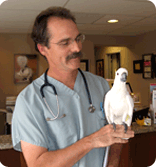Amazon with itchy skin

I am perplexed and very worried for one of my 5 Yellow-headed amazons. Four are 26 years old, and one (female, Gitana) is now about 14 years old. A couple of winters ago Gitana started pulling her feathers frantically and demonstrating that she was experiencing intense itchiness with flicking feathers, twitching, and squirming. I brought her to my avian vet and had many tests done, with no diagnostic results. The vet prescribed antibiotics, fungals and Benedryl anyway in hopes of relieving her symptoms, which I gave for several months, with no improvement. Eventually she was featherless, except for her head, tail and wings. She was clearly in pain as she pulled, and cried out. Her skin was to the point of bloodiness in a few places from all of her over-preening.
When spring arrived, her problems diminished, feathers grew back, and she and I felt great relief. Eventually, I figured that even though my house is relatively humid (by dry winter heat in Minnesota standards) that she had been suffering from dry conditions and dry skin.
Last winter I bought a humidifier, and she did very minimal feather destruction. I kept the humidity at around 35 - 50%. I started paying attention to the dryness of my own sinuses and nose and if I noticed discomfort, I increased the house humidity.
Living conditions:
My amazons get a lot of fresh food, mostly organic. In summer, they get many just picked fresh veggies that I grow in my organic garden. Some protein… usually a small amount of lightly cooked egg with a lot of veggies mixed in, or a couple of nuts or a small touch of cheese. Rarely, they get a small taste of a chip (salt rinsed off) or a little taste of toast with peanut butter. Evenings, they get a couple of teaspoons of mixed seeds (including fresh refrigerated flax seeds), organic human grade, purchased from a co-op, plus each gets 5 Harrison’s pellets. Then a small (one TBSP) piece of fruit. Filtered water, flying exercise everyday. Large stainless steel cages. In the summer, I try to get them outside at least once a week, and they get hose, full-drench baths. (In the winter they get spray bottle baths).
Gitana lives and shares a cage with a male YH, Jake, who has always been very kind to her. No signs of any problem with him. Though I formerly bred my small flock of YHs, I have not provided nest boxes since 1999. Gitana has a difficult early history, as she was bred in captivity and lived with a mentally and chemically challenged woman for the first four years of he life. She came to our flock after another female died. Gitana was too young to be involved during the years that I bred them, so she has never had chicks.
Summer in Minnesota has been very warm and humid this year. I very rarely run my central air though, preferring open windows and fans whenever possible. So I was very unpleasantly surprised to find Gitana extremely itchy again this week, and wildly picking at her feathers, belly, back and legs are bare. She is trying to get out of her skin… flicking, jerking, picking, looking very tired from the stress. She stresses and picks even when all of the others are fast asleep for the night. Cages get covered for night by dark colored sheets (old and very well washed with eco-friendly soap, line dried).
The only thing that I can recall that has changed in her diet is that I ran out of flax a couple of weeks ago, and did not buy more until yesterday. I also bought hemp oil and have put a small drop on each of their five pellets. This is just the second day, so I still have hope that these essential fatty acids will help, though so far, she is not improving and I am so worried and feel so bad for her because of her extreme discomfort. I hope that you can offer some very quick ideas and help this lovely bird who is suffering so.
If it’s an allergy, I just don’t know what to think. Much of the seasonal food she’s been getting now… organic plums, grapes, tomatoes, beans… garden stuff, she was probably not getting when this occurred last time, in winter. Other foods are not new. This is an acute reaction… she was pretty happy one day and frantic the next. I think that I will withhold peanuts, because they MAY have varying levels of aflatoxin, though I buy nuts from the Wedge Co-op, which is probably the best source. I wish that I were one of those really organized (OCD!) record keeping types and knew exactly what she had eaten for the last few years, but I am not.
I am giving her a lot of baths, but with no feathers, she shivers so easily, so I have her and Jake in a small cage outside today and yesterday because the air is on inside when we’re in the mid nineties or above. The outside temp is 93 today, well within their normal habitat range.
Any thoughts are greatly appreciated! Marie

Your question and dilemma is not an uncommon one, and challenging to help you easily with. Most importantly, I would really strongly suggest that your bird needs to be evaluated by an experienced and qualified veterinarian for a more accurate diagnosis of this problem and careful charting of a combined behavioral and medical intervention plan. There will be no simple or quick answers. Sometimes, skin biopsies are very appropriate to obtain in such intensely itchy patients from a diagnostic point of view. I’d caution against seeking symptomatic treatments (typically fail in the long run and allow the problem to become more chronic and refractory), but would more guide you towards a most optimal and more complete intervention plan.

































